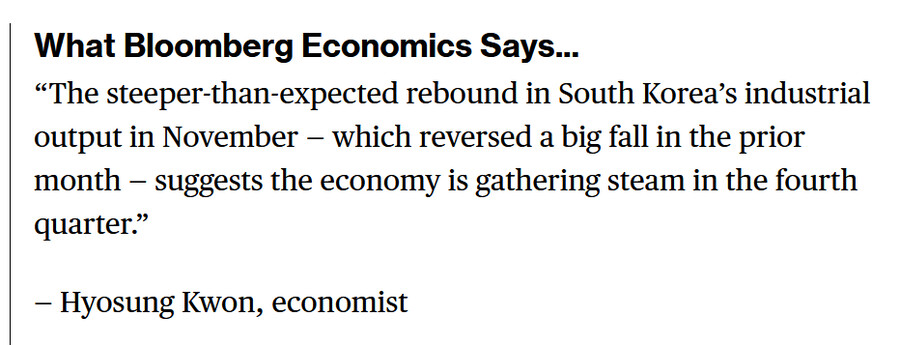-
[경제] (Bloomberg) 한국 반도체 생산 급증, 글로벌 수요 반등 조짐2023.12.29 PM 03:09
블룸버그 기사 요약 (ChatGPT)
한국 반도체 산업이 괄목할 만한 반등세를 보이며 생산과 수출 모두 인상적인 성장을 기록하며 활기를 되찾고 있습니다. 11월에는 반도체 생산이 전년 대비 42% 급증하여 수년 만에 가장 큰 증가세를 기록했으며, 2002년 이래 가장 큰 80%의 출하량 증가를 달성했습니다. 이러한 긍정적인 수치는 기술 부문의 탄력성 회복을 시사하며 한국의 내년 경제 전망에 긍정적인 영향을 미칠 것으로 예상됩니다. 삼성전자와 SK하이닉스 등 기업들의 주도로 반도체 제조 부문이 다시 활기를 띠면서 글로벌 IT 부문 수요 회복 가능성이 나타납니다.
반도체 산업의 이러한 반등세는 2023년 내내 억눌린 반도체 수요로 인해 대한민국 경제가 직면했던 어려움을 극복하는 데 있어 중요한 요인으로 여겨집니다. 하지만 지난 11월 5.3%에 달하는 기대 이상의 산업 생산 증가를 포함한 최근 데이터는 기술 제조업체들이 경제 성장을 주도하는 데 중요한 역할을 할 수 있음을 시사합니다.
한국은행은 내년 2.2%의 경제 성장을 예측하고 있으며, 이는 주로 메모리 반도체 가격 회복에 따른 수출 증가에 의해 뒷받침될 것으로 전망됩니다. 인공지능과 같은 신기술도 수요 증가에 기여할 것으로 예상됩니다. 이러한 긍정적인 지표에도 불구하고, 한국 경제의 잠재적 위험 요인으로는 중국을 중심으로 한 글로벌 경제 둔화, 지속적인 고금리로 인한 미국 소비 둔화 가능성, 그리고 보호무역주의로 인한 글로벌 무역 갈등 등이 있습니다.
=====================================================
(Bloomberg) South Korea Chip Output Jumps in Sign of Returning Global Demand
■ Semiconductor industry shows signs it’s bouncing back fast
■ Korea’s overall industrial output grows more than expected

The Samsung Electronics Co. semiconductor manufacturing plant in Pyeongtaek, South Korea.
Photographer: SeongJoon Cho/Bloomberg
South Korea’s semiconductor industry recorded the largest gains in years in both production and shipments, underscoring a revival of technology momentum that bodes well for the nation’s economic outlook next year and for the global tech sector.
Chip production jumped 42% in November from a year earlier, the most since early 2017, while shipments soared 80%, the biggest gain since late 2002, according to data released Thursday from the national statistical office. Inventories expanded by 36% in the smallest rise since February.

The numbers suggest South Korea’s most important industry is roaring back from a slump that weighed on the economy for more than a year and add to optimistic signals for chipmakers such as Samsung Electronics Co. and SK Hynix Inc., two of the country’s biggest companies. The figures also suggest a nascent recovery in global tech sector demand may be gaining momentum.
South Korea’s trade-reliant economy has muddled through 2023 with suppressed demand for semiconductors and is forecast by the central bank to have expanded 1.4% this year, less than 2.6% last year, under higher interest rates, an economic slowdown in China and geopolitical risks.
The latest chip data suggest the nation’s tech manufacturers may help support growth. The strength of semiconductor makers drove a better-than-expected 5.3% expansion in the nation’s industrial output from a year earlier in November. Demand for high-performance semiconductors has in particular helped the chip and machinery industries, the Finance Ministry said in a statement following the data.

The Bank of Korea sees the economy expanding 2.2% next year on the back of exports gaining further strength after they returned to growth in October this year. Memory-chip prices are starting to bounce back while emerging technologies such as artificial intelligence add to demand.
“We expect industrial production to pick up as global appetites for South Korean goods grows and as the local headwinds of high inflation and interest rates ease,” Shannon Nicoll, associate economist at Moody’s Analytics, said in a note.
Risks for the South Korean economy include global economic growth likely slowing next year with China continuing efforts to shore up its economy. US consumers may also start to feel a pinch from prolonged tightness in interest rates while global commerce continues to face the threat of protectionism.
user error : Error. B.